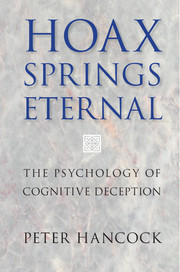II - The Psychology of Deception
Published online by Cambridge University Press: 05 January 2015
Summary
Elements of Deception
Up to this point, I have provided a general introduction to cognitive deception and recounted two stories in which deception, or at least potential deception, has played a central role. We need now to take a step back from the specific details of each of the respective stories and begin to explore the overall principles involved. To do this, I look specifically to examine the fundamental psychological dimensions that underlie deception. As noted in the more academic chapters that follow, the human aspects of deception have grown from their more general form found in the animal world. We have seen that deceptions in the animal world have their genesis in life’s overall struggle for survival. Primitive forms of deception have thus been around since life itself began. Basic forms of deception are largely illusions to confound the senses. While some deceptions are unintentional, the form with which we are centrally concerned here are those of the conscious kind brought about by the intentional mind. Our examination of these forms of deception must therefore focus on the principles of human psychology.
Human beings typically categorize the domain of deception through reference to a variety of dif erent semantic labels. These include terms such as forgeries, practical jokes, impostures, conjuring tricks, confidence games, consumer frauds, military deceptions, white lies, feints, ploys, gambling scams, and psychic hoaxes, together with other associated labels [1]. Obviously, these dif ering facets of misrepresentation overlap to some greater or lesser extent. In addition to these dif ering terms, we also tend to class deceptions according to an associated moral judgment.
- Type
- Chapter
- Information
- Hoax Springs EternalThe Psychology of Cognitive Deception, pp. 61 - 71Publisher: Cambridge University PressPrint publication year: 2015



